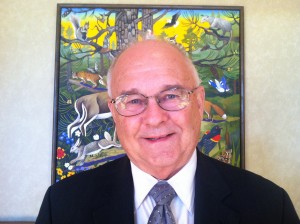Retiring Lawmaker Says Work Remains For Texas Water
State Rep. Bill Callegari (R-Houston), more than many lawmakers, knows water. An engineer, he holds “Class A” certifications in water and wastewater management. During his time in the Texas legislature, much of it spent serving on the House Natural Resources Committee, he authored several major bills on water management and water utilities. His office biography calls him “the state’s leading water expert in the Texas Legislature.”
The Katy Republican is also not what you would call an impartial observer. Having served as president of national and international water companies for decades, he hopes to work with two of his sons — also in the water business — after his upcoming retirement from the House. Like so many other state lawmakers in a part-time legislature, he often finds himself weighing in on policy discussions that have a bearing on his business future.
With those disclaimers, we thought it would be interesting to touch base with Rep. Callegari ahead of his retirement. Lawmakers have run plenty of victory laps taken since the passage of Proposition 6, the ballot measure that aims to fund the state water plan with billions in seed money. But even supporters of Prop 6 admit it will not solve all of the state’s problems.
At this year’s conference of The Academy of Medicine, Engineering, and Science of Texas (TAMEST), we talked with Callegari about what remains to be done secure Texas’ water future:
StateImpact Texas: Now that there’s money in the fund for water projects. Are we going to see a lot more action at the regional water planning level?
Rep. Callegari: The prioritization, in my opinion, is really going to be the most important aspect of this: How do you really determine which project to build first?
StateImpact Texas: Will that part of the process probably be a little more controversial?
Rep. Callegari: That it will be. But then the other thing that’s going to happen is that you’ll have some projects in high priority, then we may go through three or four years of rainy seasons, and one entity may say, “Hey, by the way, our project is not so critical now. You can move it down the list.”
So the process has to be flexible enough to handle that. Or somebody might come back and say, “It’s gotten worse, and we’re going to run out of water in so many days or in so many months. What can we do?” It’s going to be an interesting process.
StateImpact Texas: I’m wondering if that controversy is necessarily a bad thing. For so long, a lot of people ignored our water issues.
Rep. Callegari: I think that’s right. Controversy always happens in Texas anyways, so I don’t know that it’s a bad thing. I think it’ll just bring these issues forward and let ‘em talk about them and make the evaluations. I’m sure there will be people who say they picked the wrong project, but you can second-guess every coach.
StateImpact Texas: The issue of inter-basin transfers (a state rule that strictly limits how water can be sold between regions of Texas) has been something that lawmakers have been reluctant to take up. Do you see that as inevitable?
Rep. Callegari: I see it as inevitable. I don’t know how long it’s gonna take for it to happen, but I think it has to happen.
We’ve only had two or three inter-basin transfers since this rule was put in, in 1997, and it’s basically clearly served to prevent that from happening. If we’re going to take water around the state and share it where it’s needed most, we’ve got to have some kind of relaxation of that process.
StateImpact Texas: Any thoughts on the rule of capture and where that stands in terms of water rights and property rights?
Rep. Callegari: Well that’s going to get interesting, too, because the rule of capture is being sacrificed a little bit by the Groundwater [Conservation] Districts because they’re making decisions that affect how water can be used.
They’ve gotten fairly powerful over the years, and it really depends on who has control of that district. If it’s a commercial-oriented board, then they’ll give a little more to the commercial side; if it’s a landowner-oriented board, which probably most of them are, it’ll be more to the landowners.
But again we have to have the happy medium between what can be used and not, and I think a big part of that is that they’re going to have to get more involved in developing ways to preserve the aquifers’ infrastructure, and that means maybe more attempt to do aquifer injection. The problem is they don’t have money, so somebody’s gotta fund these projects.
StateImpact Texas: What is the role for lawmakers to play in this?
Rep. Callegari: One of the first things I learned when I got on the Natural Resources Committee after I got into the legislature, is that this whole term ‘Whiskey is for drinking, Water is for fighting’ is true, because almost every time someone comes up to talk about a water issue, somewhere in their conversation the word “lawsuit” comes up.
We spend more money on attorneys and legal issues than I think we do on technical issues, and as an engineer, I’d rather see us build stuff than spend all this money. But I don’t know how to stop it.
StateImpact Texas: One of the ideas you brought up in your talk was a reconfiguration of the borders of Groundwater Districts to more closely mirror our aquifers.
Rep. Callegari: I’d say that if we were starting all over, I’d certainly organize it on an aquifer basis. I don’t see much potential for that to be changed in the near future. That’s just part of the politics in the state.
StateImpact Texas: So we have to work with what we’ve got?
Rep. Callegari: That’s right. And we have this dilemma throughout the state about local control versus state control.
I’m very much a local control person, but at some point in time we’re going to figure a way to let either the Texas Water Development Board or Texas Commission on Environmental Quality to have more voice in these conflicts between the Groundwater Conservation Districts. We’ve talked about it in some of our discussions in Natural Resources, but we haven’t come up with a solution yet, because it’s such a far-reaching thing if you say, ‘Ok we’re going to give the authority to Texas Commission on Environmental Quality or the Water Development Board to override them.’
Nobody is ready to do that yet. I don’t want to see state be the sole authority, but there’s got to be some way to resolve [conflicts]. Right now it’s the courthouse, and that’s better than nothing, but it’s not the best either.
StateImpact Texas: Everyone I’ve talked to seems to agree at least on one thing: We’re going to be paying a lot more for water in the future.
Rep. Callegari: Water is going to cost more.
When you start doing more desalination, more reuse—every time you do that, you’re talking about building plants, which are expensive, and somebody’s got to pay the freight, and the freight has got to be paid by the people who use the water.
I don’t see a statewide rate. This is one case where each community has got to fly on its own.
Now, when you start talking about moving water from one region to another, some people suggest, ‘Well, maybe the state ought to pay for that.’ I don’t see that happening, certainly not in the near future.

